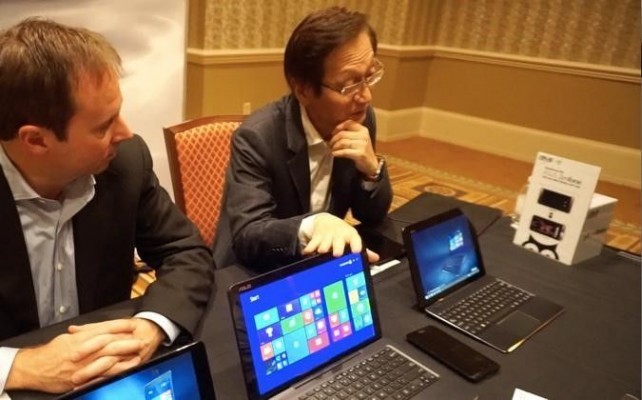Exclusive: ASUS' Jonney Shih Says His Chi Beats Surface
Sign up to receive The Snapshot, a free special dispatch from Laptop Mag, in your inbox.
You are now subscribed
Your newsletter sign-up was successful
LAS VEGAS — You can tell that ASUS Chairman Jonney Shih is excited about all of the new products his company is launching here at CES 2015, from a range of 2-in-1 devices to two new smartphones — the ZenFone 2 and the ZenFone Zoom. But the 12.5-inch Transformer Book Chi T300 is what he calls his "dream machine." And he's not afraid to say that it trumps not just the MacBook Air but also the Microsoft Surface.
With its sharp Quad HD display, razor-thin profile and Core M power, the Chi T300 will cost just $799 with a keyboard (or $699 if you opt for a traditional full-HD screen). That's a lot less than the Surface Pro 3, which costs $999 with a slightly faster Core i5 chip — but that's before you add the $129 keyboard cover.
MORE: Top 8 Windows 8.1 Tablet-Laptop Hybrids
In an exclusive interview with Laptop Mag, Shih, who was joined by Intel Senior Vice President Kirk Skaugen, also compared Android to Windows, saying that Google's platform has won the war on devices smaller than 7 inches. Here are the highlights of our conversation.
Q: Some of your competitors, like Microsoft's Surface, really push their keyboard, but then you have to pay extra for it. Why would you choose to sell The Chi T300 directly with the keyboard?
Jonney Shih: I would like to make sure that this is a complete notebook that covers my whole mobile life. For example, if I put it in my lap here, [wobbles hands above his lap] I think the Surface Pro approach is not that stable.
Q: Last year, ASUS experimented with operating systems, and there might have been an opportunity to have Android and Windows on the same device. Is that something you're moving away from in terms of a dual-OS approach?
Sign up to receive The Snapshot, a free special dispatch from Laptop Mag, in your inbox.
Shih: We had the Duet, and we were testing that for a very long time, but Google has some kind of position.
Q: As in, don't do it?
Shih: [Laughs].
Kirk Skaugen: Ask Google.
Q: Do you feel like the Windows ecosystem is robust enough for the play part of the work-and-play dynamic?
Shih: For me, frankly speaking, the apps are still not comparable to Android … For most of the Android applications, I use a smartphone.
Skaugen: With these kind of devices, being upgradable to Windows 10 is also going to help. We're both excited to be working with Microsoft for the next operating system as well.
Q: Do you see these as future-proof devices in that sense — that they're ready for Windows 10, whenever that comes along?
Shih: If you really want to cover productivity, I think Windows 10 still has a chance there. At less than 7 [inches], I think Android is already dominant.


